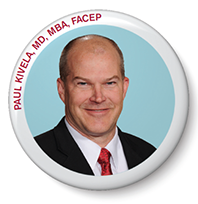
How do we take back control of our profession? By empowering physicians as leaders from the hospital boardroom to the statehouse. By taking every possible opportunity to tell our story to the public to build up the trust our patients place in emergency providers. By encouraging physician ownership of groups and emergency departments so that emergency physicians define the practice and processes as patient-centered and true to the core mission of emergency medicine.
Explore This Issue
ACEP Now: Vol 35 – No 08 – August 2016ACEP’s staff in Washington, D.C., is adept and influential, but we can do more to support the efforts of state chapters in shaping local legislation. ACEP can leverage our investment in the Clinical Emergency Data Registry (CEDR) to encourage provider-friendly improvements to the EHR, such as pushing prescription and laboratory data to the user without enduring further mouse clicks. By speaking with one voice and taking collective action for the well-being of our members and patients, ACEP can once again allow physicians to be healers and focus on practicing the art of medicine.
“Each time emergency physicians feel bogged down by the detailed legal paperwork for admitting psychiatric patients, they suffer one of those hundred-thousand betrayals.” —Hans House, MD, FACEP
 Paul Kivela, MD, MBA, FACEP (California)
Paul Kivela, MD, MBA, FACEP (California)
Current Professional Positions: managing partner, Napa Valley Emergency Medical Group; medical director, Medic Ambulance; chief medical officer, Newsura Insurance Services; business consultant, numerous medical businesses
Internships and Residency: emergency medicine internship and residency, LA County–Harbor–UCLA Medical Center
Medical Degree: MD, University of Illinois College of Medicine (1990)
Candidate Question Response:
Our specialty is under a public relations attack. Insurance companies have accused us of “balance billing” and sending “surprise medical bills.” Legislators have accused us of being a cause of the opioid epidemic and portrayed many emergency visits as expensive and unnecessary. So often over the last several years, whether it’s price or care issues, emergency medicine has been viewed as the “problem.” Hospitals have forced inefficient EHRs on us, boarded patients in the emergency department, and then complained to us about throughput times. Our approach to many of these important issues has been largely defensive of our practices. Consolidation of payers, health systems, and medical groups will add additional pressures in the very near future.
However, medicine is changing, and we must change our strategies.
ACEP needs to embrace the future and be recognized as the organization that the government, insurance companies, consumer groups, patients, and every emergency physician goes to for solutions to their problems.
Pages: 1 2 3 4 5 | Single Page





No Responses to “ACEP 2016 President-Elect Candidates Weigh In on Major Challenges, Issues Facing the College, Emergency Medicine”